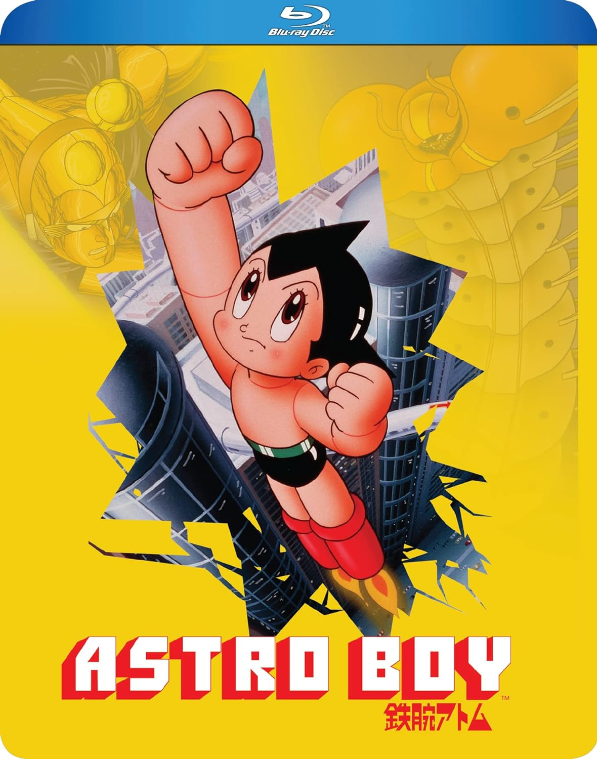
On April 3rd, 1952, Osamu Tezuka started up a new manga that would later become not only one of his most iconic works, but become a staple in Japanese children’s media that still continues to be beloved to this very day. That manga was Astro Boy, or its Japanese title, Tetsuwan Atom. Astro Boy as a character became a popular icon, helped by the fact that the 1963 anime adaptation of the manga was the first ever serialized anime series to ever air on Japanese television (Or at least, one with an ongoing plot), running for a full 193 episodes across three to four years. Said anime was also the first Japanese animated TV series to be brought over to the United States and dubbed into English, though not every episode was dubbed. I’ve only seen one episode of the 60s anime for a college class, and…it’s definitely a product of its time, mainly because its animation, while it may have been considered good when it was first made, by modern standards is extremely primitive. Seriously, most of the action scenes in the 60s Astro Boy consist of nothing but still images and cutaways, that’s it. Though it seemed even Tezuka and his team realized how poorly the 60s series had aged, as later on, they decided to form a company called Tezuka Productions for the sole purpose of remaking the Astro Boy anime from scratch, which would come to fruition in 1980. Said 80s remake of Astro Boy is the subject of today’s review, as last year, the mad lads at Discotek Media managed to license it and put it out on Blu-Ray. Now that I’ve seen the entire series, my verdict is…it’s okay. It definitely looks amazing for its time, and is a pretty good kids show in its own right, but even without having seen the 60s series, the 1980 remake has some problems of its own.
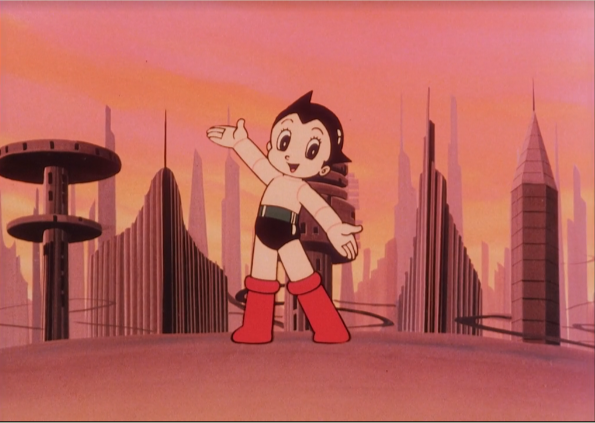
The remake does follow the same storyline as both the manga and the 60s anime: In Japan during the year 2030, a scientist named Dr. Tenma is trying to create a robot capable of expressing human emotions, so engrossed in his task that he forgets to take his son Tobio to the amusement park. In his anger, Tobio tries to go to the amusement park himself, but gets into a terrible accident and dies from his injuries. Unable to move on from the loss of his son, Dr. Tenma decides to mold the robot into what is basically a replacement for Tobio and succeeds in bringing the robot to life. But not only does the robot child act differently from Tobio, he’s unable to control his strength. Angered at how things turned out, Dr. Tenma disowns the robot, and it winds up being recruited to work for a back alley circus. Luckily, a scientist by the name of Dr. Ochanomizu manages to save the robot from the ringleader’s mistreatment, renaming him Astro (Atom in the Japanese version) and bringing him to Tokyo, assigning him as the defender of the city. Other than the first few episodes and a running plot thread about another robot named Atlas, Astro Boy as a series is pretty episodic, all of which show Astro solving various problems with his robot powers and saving people.
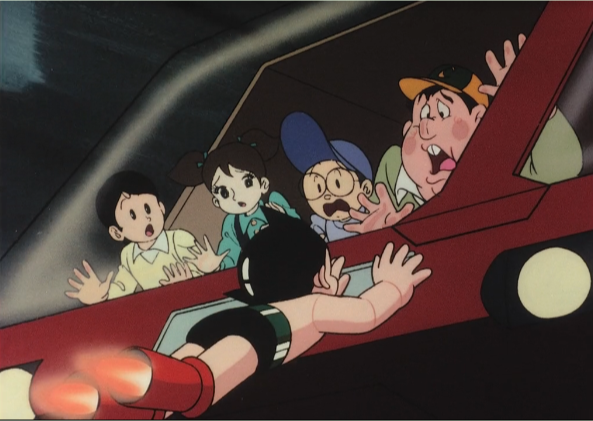
Considering this remake was made solely to improve on the sixties series and give it better animation, I can definitely say that Tezuka Productions succeeded in their goal, because the animation here is MUCH better than the sixties version. While parts of it are held back by the limitations of the technology of the time, the action scenes are extremely fluid and are bursting with kinetic energy. The backgrounds are well rendered, character designs are more detailed while still maintaining Tezuka’s iconic style, and the series being made with hand-painted cels really give it a rustic look that you can’t find in most anime anymore. That being said, it’s not without its issues, and there are times where several characters go off model. The animation does start to dip in quality later in the series, but not by much. There’s also the fact that this rendition of Astro Boy is only 52 episodes long as opposed to the sixties series’ 193, which prevents the series from overstaying its welcome and dragging itself out. I haven’t seen the 2003 anime beyond half the first episode, so I can’t comment on how that series’ pacing and plot progression is compared to this one or the sixties series.
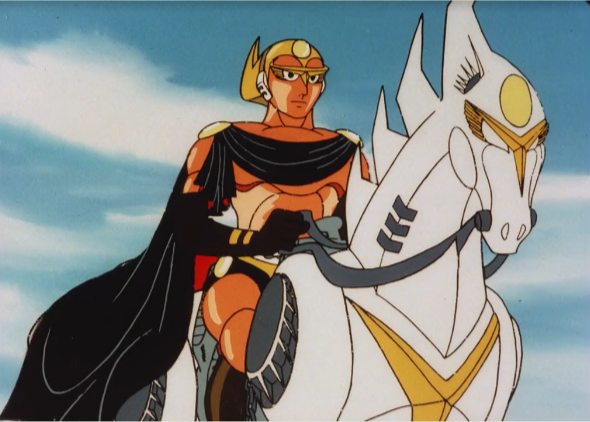
The soundtrack is pretty good too, even if it’s not particularly memorable. I did find the opening theme song to be pretty cute, and I like that it had a children’s choir sing it as a call back to the fact that NBC’s dub of the sixties series did the exact same thing…which apparently inspired Japan to do that for all its anime openings from then on. Funny how something from America influenced Japan, though Tezuka’s art style did take inspiration from Disney, so there’s that. Something I find to be both interesting and funny is that sometimes this series uses public domain classical music at points. One episode used the Can-Can, others used Night on Bald Mountain, Tchaikovsky’s Swan Lake, and one I’m not as familiar with, Mars: Bringer of War from Gustav Holst’s Planets. Hell, in episode one, Astro’s “birth” is accompanied by a literal beat-for-beat recreation of Richard Strauss’ 1896 composition, Also Sprach Zarathustra, specifically the rendition from Stanley Kurbick’s 2001: A Space Odyssey, which had only come out twelve years prior. Not only is this a great call back to another piece of famous sci-fi media that influenced the genre for generations to come, it also makes for a nice meta in-joke because not only is Tezuka a HUGE fan of the movie itself, he was personally invited by Kubrick to be an art director for the movie, but couldn’t do it due to other obligations. It makes me wonder if Tezuka threw that in as a homage to 2001, or just for funsies.
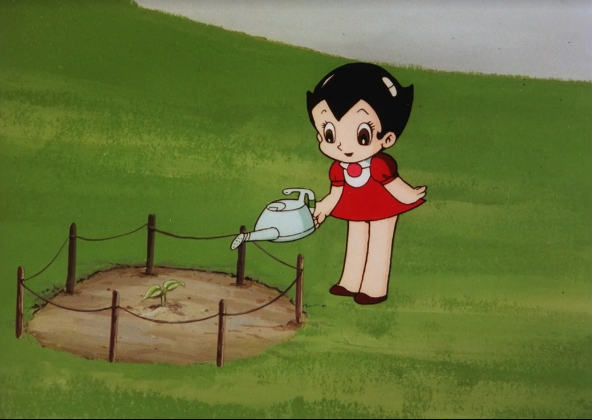
I do think the remake kind of dropped the ball in terms of fleshing out its characters. With the show’s episodic nature, the characters don’t really change all that much, with some exceptions. I don’t know if this was the same in both the 60s and 2003 series, so I can’t compare it to those. I also feel like the show missed some opportunities to develop its characters. For example, when Uran is first introduced, Astro is at first annoyed with Uran’s behavior, to the point where he flat-out abandons her in the middle of town…but here’s the thing: Dr. Tenma did the exact same thing to Astro when he was first born, and you’d think the show would follow up on this and have Astro realize he did the same thing to Uran what Dr. Tenma did to him, maybe have him feel that he’s no better than Dr. Tenma and resolving to reconcile with Uran and accept her for how she is, not wanting to be like Dr. Tenma and repeat his mistakes. But the show doesn’t do that, and when all is said and done, it’s never brought up ever again. There are also times when the show’s character writing is wildly inconsistent, even in the same episode. In one episode, Astro’s dog Jump gets hurt, and Uran is constantly flip-flopping between worrying about his welfare and not giving a shit and wanting a robot dog. BTW, I think Uran is the worst character in the show because she’s an annoying brat who is constantly causing needless trouble and tons of property damage, has no remorse for anything she does, and is an unrepentant bully on top of it. It really says a lot that Naoki Urasawa of all people managed to write Uran a lot better and make her more likeable while keeping the essence of her character.
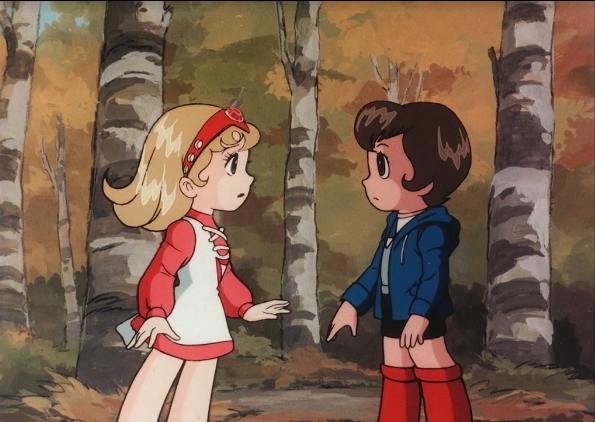
Because of the show’s episodic formula, some episodes are better written than others, and not every episode hits a home run. I actually think the best episodes are the first four or five, the ones that tell Astro’s origin story and show how he integrates into Tokyo under Dr. Ochanomizu’s care…and usually Uran is the focus of some of the series’ worst episodes. Actually, in my opinion, the episode I feel is the weakest one in the series managed to make me feel sorry for Uran, and I don’t think it was supposed to. In that episode, Uran steals a kid’s toy car and blows it up like usual, and everyone has had enough of her behavior and decide to do something about it. But rather than making the issue about Uran’s lack of self control and teaching her to be nicer to others and be less of a bully, for some reason everyone thinks the issue is her being a tomboy and their solution is to sign her up for music and etiquette classes to make her more ladylike, which plays into Japan’s super strict enforcement of gender roles and the whole thing of “Girls who are tomboys need to be more feminine and ladylike, because that’s the only way we as a society will give a damn about them!” One episode just felt like an excuse to be a crossover with other Tezuka works such as Black Jack and Princess Knight. Hell, there’s even one episode that flat-out causes a massive continuity error that contradicts how Astro’s origin story was told in the first few episodes. Said episode involved an astronaut discovering he was really a robot, and his father would rebuild him every few months to give him the appearance of aging like a human. When asked why, his father explained that he heard the story of when Dr. Tenma made Astro to replace his deceased son Tobio, but after discovering he couldn’t grow, he rejected him and sold him to the circus. This is a call back to Astro’s origin story from the manga and the 60’s anime, but in this 1980 remake, Astro had unintentionally embarrassed Dr. Tenma on a cruise, he scolded him out of anger (and got separated from him due to the ship crashing into an iceberg), and the ringmaster of the Robot Circus found Astro and led him astray, rather than being sold to the circus by Dr. Tenma. It’s rather strange that the 80’s adaptation made mention of this story when it didn’t happen like that this time, and I’m honestly surprised nobody at Tezuka Productions caught this and fixed it. How in the world did they allow such an obvious mistake to slip past them like this? You’d think that Tezuka, being more involved in this series’ production, would bother to keep things consistent!
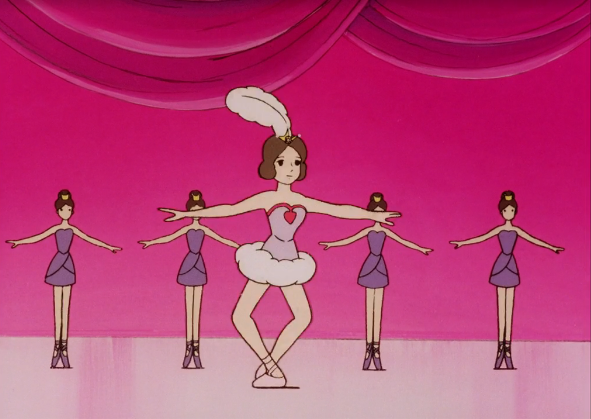
This next thing is more of a personal nitpick than anything, as it yet again involves Uran, but I need to get this out of my system: Whose bright idea was it to have Uran constantly flash panty shots every single time she takes one step?! I know she’s technically a robot, but it’s really creepy that in nearly every single scene, her underwear is constantly shown whenever she so much as moves around, and the fact that she was deliberately designed as a child really doesn’t help matters! It also doesn’t help that her dress is so short that it makes her look like she’s wearing just a shirt and nothing underneath. I know this was the eighties and Japan has a different view of this sort of stuff, but…the fact that there was SO MUCH of it here was just really off-putting to me. Sailor Moon also had this problem somewhat, but that was slightly remedied by the fact that the girls’ magical girl outfits consisted of leotards and that whatever panty shots there were were at the very least much more spread out across the five seasons and not constantly shoved in your face every nanosecond. I hear this issue was fixed in the 2003 series by giving Uran a new outfit, but I haven’t seen it, so do correct me if I’m wrong.
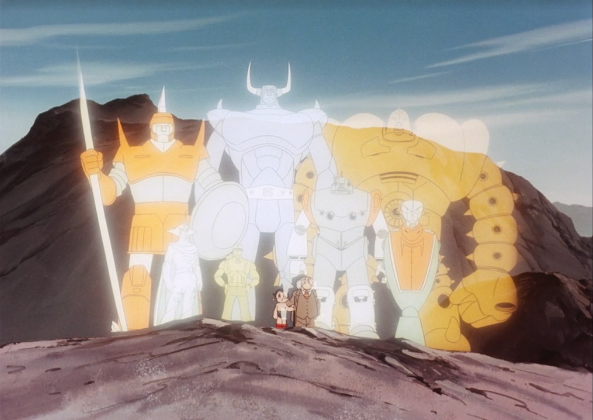
Okay, I better get off my Uran soapbox. So yeah, while not a perfect remake of the sixties series, Tezuka Productions did achieve what they set out to do by giving Astro Boy some much needed polish and fixing whatever issues plagued the original show. Plus, as flawed as this series is, I am glad I blind-bought Discotek’s blu-ray for Astro Boy 1980 and watched it, and there’s no denying the massive influence Astro Boy in general has had on pretty much the entire anime industry before and since. This is especially good since the Japanese version of the 1980 series is finally made more accessible to American audiences when it wasn’t so before. Here’s hoping Discotek manages to wring the rights to the 2003 series from Mill Creek and put that out on BR, Japanese version and all, since I hear the dub for that made a LOT of changes from the original. So yeah, if you like Osamu Tezuka and want to see Astro Boy but are put off by both the limited animation and sheer length of the sixties series, give the 1980 series a shot…if you’re able to or willing to handle Uran’s incessant brattiness, that is.

You hardly mention the adaptation of the World’s mightiest Robot and how it differs from the manga version. I think you spent too much time complaining about Uran.
I haven’t read the manga.